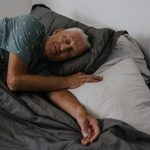Ms. B has always been careful about her diet. She does not stay up late. And she has her health and teeth checked every year. Although over 70 years old, she still looks good. However, 3 years ago, she fell and injured my hip joint. After the operation, she had some difficulty in moving. To avoid another fall, she relied more on a wheelchair to get around. She has not fallen again in the past three years, but one thing worries her: her declining cognitive ability.
She complies with medication and follows strict dietary habits. She has taken enough protein and fiber, and her blood pressure and cholesterol are well controlled. Her blood sugar is slightly high, but she does not need to take diabetes medicine for the time being. The brain scan found no major problems, and she has no issues with mood or sleep. On the surface, she had done all the work to protect her mind, so what else was missing? It turned out that Ms. B ignored her muscle loss problem. The muscles in our limbs and trunk don’t solely move the body, but they also act as endocrine organs. When the limbs move and the muscles contract, they release myokines into the blood. These myokines are involved in blood sugar metabolism in the brain.
To maintain good cognitive function, the brain must have smooth blood vessels and oxygen-sufficient blood. Additionally, the brain must be allowed to effectively use the fuel (that is, glucose) transported through the blood. To achieve this, the brain and other organs need to be sensitive enough to insulin. Otherwise, even if there is fuel, it will not be converted into energy.
For the brain to have enough energy to perform cognitive functions, the muscles must be sufficiently exercised to release myokines and increase the brain’s sensitivity to insulin. Ms. B started muscle training with the assistance of her coach. She fell in love with Tai Chi exercises, especially the squatting movement. This strengthened the muscles in her lower limbs, giving her greater confidence in walking and freeing her from psychological dependence on the wheelchair. As her muscles grew stronger, her cognitive abilities and blood sugar improved significantly. Ms. B’s recovery experience once again reminds us that the brain and various body parts are interconnected.
Written by: Dr. William Chui
Originally posted on: HKEJ Health
Translated by: Cheuk Long Chan






